
Jeremiah "Jerry" Cruncher is a fictional character in Charles Dickens' 1859 novel A Tale of Two Cities .

Jeremiah "Jerry" Cruncher is a fictional character in Charles Dickens' 1859 novel A Tale of Two Cities .
Jeremiah "Jerry" Cruncher is employed as a porter for Tellson's Bank of London. He earns extra money as a resurrection man removing bodies from their graves for sale to medical schools and students as cadavers. During the story, Jerry Cruncher accompanies Jarvis Lorry and Lucie Manette to Paris to retrieve Dr. Alexandre Manette. Back in England, he helps Sydney Carton "get something" on the paid government witness and spy, John Barsad. He accompanies Lucie and Miss Pross to church the night they run into Sydney Carton and later that night Cruncher tries to unsuccessfully "resurrect" Barsad's colleague and fellow spy Roger Cly in the graveyard. Later in Paris, Jerry will remember that Cly was not in his coffin and will pass this information onto Carton who will use it to blackmail Barsad into getting Carton into the prison to rescue Charles Darnay who has been imprisoned by revolutionaries. Before leaving Paris, Cruncher will renounce grave robbing and resolve to be more gentle with his wife, toward whom he had been abusive physically and verbally.
In the 1935 film adaptation, Jerry Cruncher is portrayed by Billy Bevan.
In the 1958 film adaptation, Jerry Cruncher is portrayed by Alfie Bass.
In the 1980 TV Movie A Tale of Two Cities , Jerry Cruncher is portrayed by George Innes.
In the 2008 Broadway musical adaptation of 'A Tale of Two Cities,' Jerry Cruncher was played by Craig Bennett.
A Tale of Two Cities is a 1935 film based upon Charles Dickens' 1859 historical novel, A Tale of Two Cities, set in London and Paris. The film stars Ronald Colman as Sydney Carton and Elizabeth Allan as Lucie Manette. The supporting players include Edna May Oliver, Reginald Owen, Basil Rathbone, Lucille La Verne, Blanche Yurka, Henry B. Walthall and Donald Woods. It was directed by Jack Conway from a screenplay by W. P. Lipscomb and S. N. Behrman. The film was nominated for the Academy Award for Best Picture and Best Film Editing.
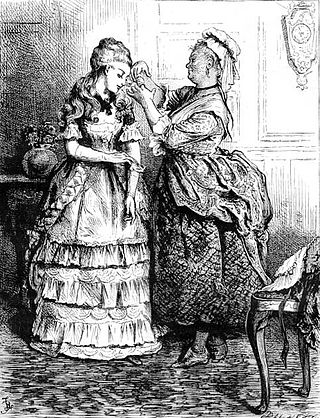
Lucie Manette is a character in Charles Dickens' 1859 novel A Tale of Two Cities.
Doctor Alexandre Manette is a character in Charles Dickens' 1859 novel A Tale of Two Cities. He is Lucie's father, a brilliant physician, and spent eighteen years "in secret" as a prisoner in the Bastille prior to the French Revolution. He is imprisoned because in the course of his medical practice he learns of abusive actions by two members of the aristocratic Evrémonde family. While realizing the power at court of nobles such as the Evrémondes, Manette reports them to a minister of the royal government. He is seized from his young family and imprisoned under a lettre de cachet.

Sydney Carton is a central character in Charles Dickens' 1859 novel A Tale of Two Cities. He is a shrewd young Englishman educated at Shrewsbury School, and sometime junior to his fellow barrister Stryver. Carton is portrayed as a brilliant but depressed and cynical drunkard who is full of self-loathing because of what he sees as his wasted life. He feels a deep unrequited love for Lucie Manette, who nevertheless inspires him to try to be a better person. Near the end of the novel, Carton manages to change places with Lucie's husband, Charles Darnay, hours before Darnay's scheduled execution in France, giving his life for Lucie's sake. Later, Lucie and Charles name their second son after Carton.
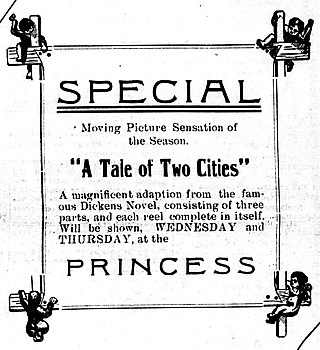
A Tale of Two Cities is a 1911 silent film produced by Vitagraph Studios, loosely based on the 1859 novel by Charles Dickens.

Charles Darnay, Charles D'Aulnais or Charles St. Evrémonde is a fictional character in the 1859 novel A Tale of Two Cities by Charles Dickens.
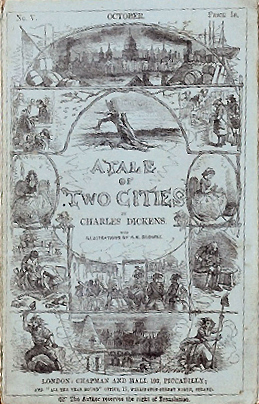
A Tale of Two Cities is a historical novel published in 1859 by Charles Dickens, set in London and Paris before and during the French Revolution. The novel tells the story of the French Doctor Manette, his 18-year-long imprisonment in the Bastille in Paris, and his release to live in London with his daughter Lucie whom he had never met. The story is set against the conditions that led up to the French Revolution and the Reign of Terror.
Ernest Defarge is a fictional character in Charles Dickens' 1859 novel, A Tale of Two Cities.
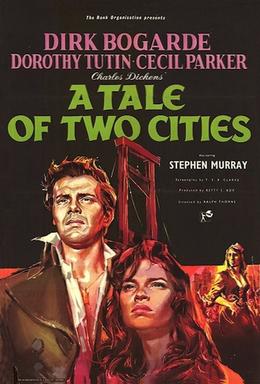
A Tale of Two Cities is a 1958 British film directed by Ralph Thomas and starring Dirk Bogarde and Dorothy Tutin. It is a period drama based on parts of Charles Dickens' novel A Tale of Two Cities (1859).

A Tale of Two Cities is a musical with book, music and lyrics by Jill Santoriello based on the 1859 novel of the same name by Charles Dickens.
John Barsad is a character in Charles Dickens' 1859 novel, A Tale of Two Cities.
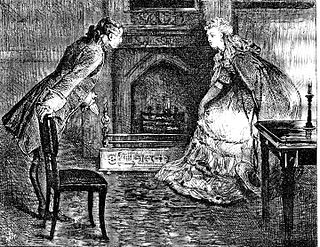
Jarvis Lorry is a character in Charles Dickens' 1859 novel, A Tale of Two Cities.

Miss Pross is a character in Charles Dickens' 1859 novel A Tale of Two Cities.
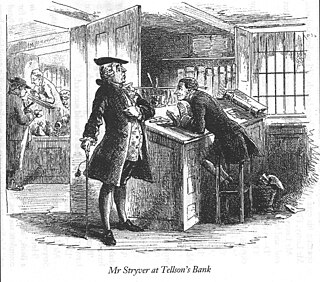
C.J. Stryver is a character in Charles Dickens's 1859 novel A Tale of Two Cities and in the television and film adaptations of the story. He is a barrister in London, with the character Sydney Carton working under him.

The Only Way is a 1926 British drama film directed by Herbert Wilcox and starring John Martin Harvey, Madge Stuart and Betty Faire. It was adapted from the play The Only Way which was itself based on the 1859 novel A Tale of Two Cities by Charles Dickens. John Martin Harvey had been playing Carton in the play since 1899 and it was his most popular work. It cost £24,000 to make and was shot at Twickenham Studios. The film was a commercial success and reportedly took over £53,000 in its first two years on release. It was a particularly notable achievement given the collapse in British film production between the Slump of 1924 and the passage of the Cinematograph Films Act 1927 designed to support British film making.
A Tale of Two Cities is a 1922 British silent drama film directed by Walter Courtney Rowden and starring Clive Brook, Ann Trevor and J. Fisher White. The film is an adaptation of the 1859 novel A Tale of Two Cities by Charles Dickens, and its plot concerns events taking place during the French Revolution. It was made as part of the "Tense Moments with Great Authors Series" of films.
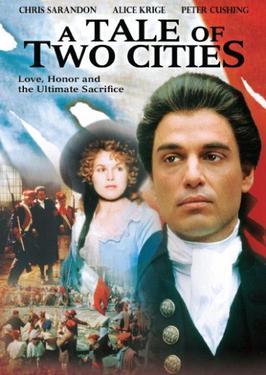
A Tale of Two Cities is a 1980 American historical drama film made for TV, directed by Jim Goddard and starring Chris Sarandon, who plays dual roles as two characters who are in love with the same woman. It is based on the 1859 Charles Dickens novel of the same name set in the French Revolution.

A Tale of Two Cities is a British television series which first aired on BBC 1 in 1980. It is an adaptation of the novel A Tale of Two Cities by Charles Dickens. Paul Shelley plays the duel roles of Sydney Carton and Charles Darnay, the first actor to do so since William Farnum in the 1917 silent adaptation. Two weeks later, an American production was released featuring Chris Sarandon in the same duel roles.
A Tale of Two Cities is a British television series which first aired on BBC 1 in 1965. It is an adaptation of the novel A Tale of Two Cities by Charles Dickens. Out of the 10 episodes produced, 8 are believed to be lost. Episodes 2 and 3 survive, and various promotional photographs and productions stills featuring the actors in costume are available online.

A Tale of Two Cities is a British-French television series which first aired on ITV in 1989. It is an adaptation of the novel A Tale of Two Cities by Charles Dickens.